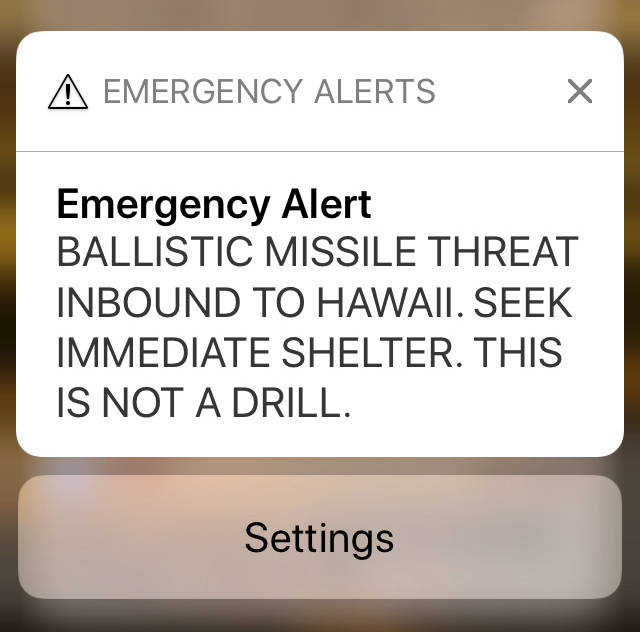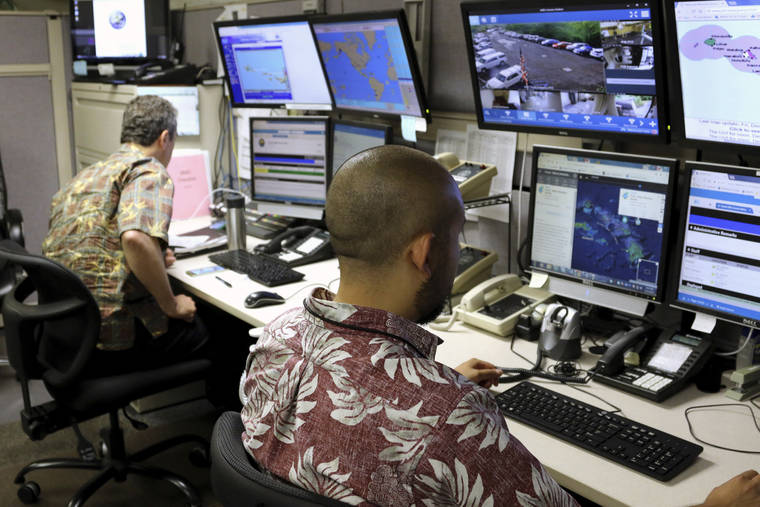Senate bill aims to prevent repeat of Hawaii false missile alert

ASSOCIATED PRESS / Jan. 13, 2018
This cell phone screen capture shows a false incoming ballistic missile emergency alert sent from the Hawaii Emergency Management Agency system sent on Jan. 13, 2018. The U.S. Senate passed a bill that includes a provision taking away the authority and responsibility for notifying residents of incoming missiles from local emergency managers. Instead it gives that job to the U.S. government.

CALEB JONES / ASSOCIATED PRESS
Hawaii Emergency Management Agency officials work at the department’s command center in Diamond Head in December 2017.

KAT WADE / SPECIAL TO THE STAR-ADVERTISER / MAY 28
U.S. Sen. Brian Schatz, shown here at town hall at Washington Middle School in Honolulu in May, authored a measure passed by the Senate Tuesday that gives the U.S. government, not local authorities, the job of notifying residents of incoming missile threats.



A defense bill passed by the U.S. Senate on Tuesday seeks to prevent local government agencies from mistakenly warning residents of a ballistic missile attack the way Hawaii did nearly two years ago.
The legislation includes a provision giving the U.S. government, not local authorities, the job of notifying residents of incoming missile threats.
U.S. Sen. Brian Schatz authored the measure after officials in Hawaii blasted cell phone and broadcast alerts warning a ballistic missile was heading toward the islands.
“It was a terrifying experience for many of us,” Schatz said of the day when many in Hawaii believed they would perish in a nuclear catastrophe. “And we’re hopeful that this change in the law puts that chapter behind us for good.”
Local officials aren’t the ones to know whether the country is at war, Schatz said. The authorities who know should be the ones to inform the public, he said.
“The fewer steps in the process, and opportunities for mistakes to be made, the better,” the Hawaii Democrat said.
Don't miss out on what's happening!
Stay in touch with breaking news, as it happens, conveniently in your email inbox. It's FREE!
The House last week passed the bill, the National Defense Authorization Act, which includes the missile alert measure. The Senate’s passage of the bill sends it to President Donald Trump, who is expected to sign it.
Gov. David Ige, who was widely criticized for his handling of the incident, said in a statement that he would cooperate with other government agencies on the new program.
“I want the best system possible to alert our community should there be an incident, and I’m committed to working with our federal and county partners to implement a system that does that,” Ige said.
On Jan. 13, 2018, the false alert from the Hawaii Emergency Management Agency read “BALLISTIC MISSILE THREAT INBOUND TO HAWAII. SEEK IMMEDIATE SHELTER. THIS IS NOT A DRILL.” It triggered widespread panic as many of the more than a million residents and visitors feared they were about to face a ballistic missile strike.
Several months earlier the agency had launched a new effort to notify residents of any missile threats.
The initiative began in response to growing concerns that North Korea was developing nuclear weapons and long-range missiles capable of reaching Hawaii.
But a Hawaii Department of Defense review conducted after the botched alert found officials failed to fully develop their plans for these warnings before launching the program. It found an outreach campaign wasn’t effective, and the public didn’t get adequate directions about what to do if they ever received a warning.
The false alert went out because an emergency management agency employee mistakenly sent the alert during a shift-change drill.
Officials later disclosed the employee didn’t think he and his colleagues were participating in a drill and instead believed a real attack was imminent. The state fired him.




